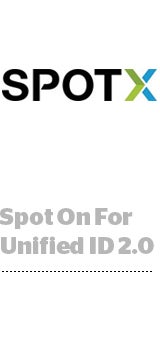Here’s today’s AdExchanger.com news round-up… Want it by email? Sign up here.
U & Me And UID 2.0
Welcome to the Unified ID 2.0 cocktail party, SpotX. The video SSP, which is owned by RTL, is the latest company to sign up in support of UID 2.0, the open source industry initiative originally spearheaded by The Trade Desk that aims to replace the third-party cookie with hashed or encrypted email addresses. Specifically, SpotX says that allowing media owners to access UID 2.0 will help them gain more control over their proprietary data and generate higher CPMs while maintaining trust with consumers, Adweek reports. Ah, the holy grail of an ad-supported value exchange. SpotX joins a long and ever-growing list of UID 2.0 supporters, including IRIS.TV , The Washington Post, OpenX, Neustar, Mediavine, PubMatic, Magnite, Index Exchange, Nielsen, Criteo and LiveRamp.
Don’t Believe The Hype?
For all the hype around podcasts these days – hello Amazon and Wondery – Spotify has to show investors the money. Shares of Spotify took a hit after Citi analysts downgraded the stock because, they said, the audio streaming giant hasn’t shown “any material benefit” from its $800 million plus investment in podcasting content and tech, per Variety. Spotify’s stock price closed down 6.6% on Friday to $319.82 per share, outpacing smaller declines in the broader market. In 2020, shares of the company more than doubled in value on investor enthusiasm for Spotify’s global expansion and business model, including its push into podcasts. The Citi analysts wrote that “our fear is that if podcasting doesn’t provide a way for Spotify to shift away from music label dependence, the Street may reassess the underlying value of the business. And, that would be bad for Spotify’s multiple and equity value.” Meanwhile, The Information reports that Apple – long considered the sleeping giant in the podcast space – is waking up as it plans to launch a new podcast subscription service that could be a threat to Spotify.
Expecting The Expected
When it comes to the inauguration of Joe Biden as US president on Jan. 20, CBS News and other news outlets including ABC News and Cheddar are preparing for the unpredictable following the assault on the Capitol on Jan. 6. “We will be on even higher alert than we normally are for breaking news,” CBS News Digital EVP and GM Christy Tanner told Digiday. On Inauguration Day, TV and streaming news networks will not only be on guard for breaking news, but for the safety of their reporters and crew members on the ground in Washington, D.C. Networks are adopting extra security measures for Inauguration Day, though their executives pointed out that increased security has become the norm for news organizations. “To some extent, these are things that are part of our everyday life and will not keep us from covering the news. We’re the same organization that goes to war zones and disaster zones,” said Katie den Daas, executive producer at ABC News Live.
But Wait, There’s More!
The five-month old industry organization Partnership for Responsible Addressable Media (PRAM for short) is seeking input about potential new technologies that could replace cookies and other identifiers that are used for ad targeting. [MediaPost]
In a sign of the times, Nielsen will now measure premium films that go straight to streaming. [Cord Cutters News]
Meet Transmit.LIVE, a startup founded by ad tech execs – including Seth Hittman, who sold mobile ad platform RUN to Publicis in 2014 – that plans to bring picture-in-picture ads to live streaming video. [WSJ]
Here’s an investor outlook for digital advertising as the cookie (continues to) crumble. [Investor’s Business Daily]
Creative shop Mother launches its own media agency – dubbed Media by Mother – led by Accenture and WPP vets. [Adweek]
TikTok is the top branding platform for reaching young consumers, according to a new survey of 52 ad buyers who control $14.7 billion in spend. [Business Insider]
You’re Hired!
Walmart’s ecommerce boss, Marc Lore, will exit the company five years after it bought his startup Jet.com. [WSJ]
Snap has promoted exec Ben Schwein to be its new SVP of content and partnerships, a move that signals Snap’s desire to compete more aggressively with TikTok. [The Information]














